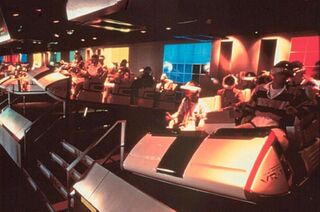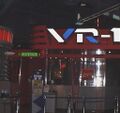Difference between revisions of "VR-1"
From Sega Retro
m (→Images) |
m |
||
| Line 76: | Line 76: | ||
<references/> | <references/> | ||
| − | {{ | + | {{MVD}} |
Revision as of 23:33, 9 April 2021

| |||||
| VR-1 | |||||
|---|---|---|---|---|---|
| System(s): Medium-scale attraction | |||||
| Publisher: Sega | |||||
| Developer: Sega AM3[1], Sega AM5[2] | |||||
|
This short article is in need of work. You can help Sega Retro by adding to it.
The VR-1 or Virtual Reality-1 is an interactive virtual reality motion simulator attraction developed by Sega AM3 and Sega AM5. Released in July 1994, it was frequently installed in the company’s flagship arcade venues such as Joypolis and SegaWorld.
The hardware is unrelated to the similarly-named Sega VR.
Contents
History
Development
The simulator’s Mega Visor Display, created by Sega AM3 alongside UK-based Virtuality, would see later use in 1995’s Sega Net Merc hardware.
Two games were released for the attraction, 1994's Space Mission and 1995's Planet Adventure,[3] before it was later retired in favor of newer simulators.
Locations
VR-1 was first installed at Yokohama Joypolis, starring as one of the park’s feature attractions at it’s July 1994 opening.
- Yokohama Joypolis
- Ichikawa Galbo
- Yokkaichi Galbo
- Niigata Joypolis
- Fukuoka Joypolis
- SegaWorld London
- Sega World Sydney
No VR-1 units are known to remain in operation.
Preservation
After the subsequent downsizing and closures of the venues that housed it during the late 1990s and early 2000s, there remain no known locations where the attraction remains in operation, and both its games are additionally unpreserved.
Legacy
The VR-1, and specifically it’s Mega Visor Display, has been recognized as one of the most advanced head-mounted displays of its generation. It subsequently inspired the designs of several other examples, ensured Sega's reputation as an early virtual reality pioneer, and set a benchmark not thought to have been surpassed until the late 2010s.[4]
Games
- Space Mission (1994)
- Planet Adventure (1995)
Patents
Promotional material
Videos
Footage of the attraction and Space Mission from the 01/07/1995 edition of Famitsu television series Game Catalogue 2
Images
VR-1 at Yokohama Joypolis
VR-1 at Niigata Joypolis
VR-1 at Fukuoka Joypolis
VR-1 at SegaWorld London
VR-1 at Sega World Sydney
References
- ↑ htt (Wayback Machine: 2004-06-10 03:24)
- ↑ File:SSM_JP_19960614_1996-09.pdf, page 144
- ↑ http://www.sega.co.jp/sega/atp/atc/vr1planeta.html (Wayback Machine: 1999-10-11 04:00)
- ↑ https://www.vrfocus.com/2020/07/the-virtual-arena-blast-from-the-past-the-vr-1/
| Mega Visor Display | |
|---|---|
| Hardware | Mega Visor Display | VR-1 | Sega Net Merc |
| Software | Space Mission | Planet Adventure | Dennou Senki Net Merc |










